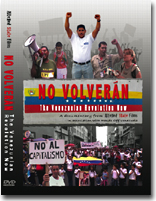The five "engines" for Socialism: meetings in support of the Venezuelan Revolution in IrelandP. Bowman (Dublin)Hands off Venezuela, in co-operation with the Venezuela Support Group and the James Connolly Debating society in Belfast, organised two meetings in support of the Venezuelan Revolution in Dublin (8th October) and Belfast (10th October). The idea was also to continue with the campaign Hands off Venezuela – Ireland, already constituted after a first round of meetings held last April in two Irish Universities.
More than 35 people attended the meeting in Dublin (including activists from SIPTU and other unions, from the Connolly Youth Movement, éirígí, the Labour Youth, the CPI and others). The meeting in Belfast was hosted by the James Connolly Debating Society and had an enthusiastic audience of about 60 people from many different backgrounds.
The meetings intended to explain "the five engines for socialism"; the programme that the Venezuelan government will try to implement in the next future. 63 per cent of the population of Venezuela voted for that programme in the election held last December.
Carlos Fiorillo, member of the Unified Socialist Party of Venezuela (PSUV) and Hands off Venezuela – Ireland, presented for the first time in English translation some sections of three speeches about the "5 engines" that President Hugo Chavez made between the 8 th and the 17th of January 2007. Carlos said:
"The 5 Engines is the name of the procedure that is taking place in Venezuela in order to make the transition from a capitalist state to a new socialist state on behalf of the Venezuelan people, and to nationalize the resources for the well-being of the whole country; as president Chavez promised when he won the last presidential elections on December 2006."
The first engine, Carlos went on, is the enabling law. With that law the Venezuelan government will be able to nationalize all that was privatized; the second engine is a constitutional change to allow the people of Venezuela to go towards socialism. President Hugo Chavez, according to Carlos, said that, "Venezuelans [in the election last December] voted for socialism … [Socialism] is what people want … [Socialism] is what the country needs… Venezuela is free, we are not colony of anybody."
The third engine is national education on socialist values and solidarity, and access to education for all at all levels: "study is the debate of ideas in a permanent way." The fourth engine is a new "geometry" of power, based on popular power, in order to eliminate the differences between classes and the obscene privileges of the bureaucrats and the ruling class. The fifth engine, Carlos concluded, was the "explosion" of popular, revolutionary, socialist and democratic power through the creation of communal councils and federations of communal councils.
Jorge Martin, international secretary of Hands Off Venezuela Campaign, analysed the current situation in Venezuela. The political process unfolding in Venezuela, he said, has a socialist character and is fully democratic. It is not the first time that Hugo Chavez wins an election, but this time he got 63 per cent of the votes, he said.
The problem, Jorge argued, is that the imperialist powers don't agree with the nationalisation of the basic means of production in order to satisfied the needs of the people of Venezuela; it goes against their profits. This is so even when any nationalisation and expropriation has been carried out according to law and with payment of compensation.
So, Jorge continued, the imperialists will try anything they can to get rid of Chavez and put back into power the old corrupt oligarchy. They already tried with the US-backed military coup and the bosses lock out in 2002. This shows the hypocrisy of the US and European governments when they accuse Chavez of being undemocratic.
In the meeting in Belfast some people in the audience asked what people could do in Ireland to support the people of Venezuela and to stop the imperialist intervention. In Dublin, some also expressed the need to actively support the Bolivarian movement. Jorge Martin made clear, first, that the broadest possible movement in solidarity with Venezuela should be organised in Ireland. He made an appeal to all those who agree with three basic principles, full support for the Bolivarian revolution, against imperialist intervention and counteracting the lies of the media, should join Hands Off Venezuela.
The first thing to do, he said, was to tell the youth and the workers in our communities what is really happening in Venezuela. That is the only way to counteract the lies spread in the mass media, owned by a few large corporations, about the Venezuelan government.
This could be done by organising talks and projecting documentaries in colleges and in meetings with trade unionists, by passing resolutions in trade union congresses, by getting youth organisations and trade unions to link up with our solidarity groups, etc. He underlined several times the importance of getting the support of the working class in our communities through their trade unions.
Jorge Martin suggested raising funds and getting trade unions to sponsor delegations trips of Irish workers and students to Venezuela in order to witness what is really happening in Venezuela, and reporting back in their communities, trade unions, and study places.
We would like to thank all those who made these meeting possible.
Contact Hands Off Venezuela Ireland ( hov.ireland@yahoo.com) or visit our yahoo group (http://groups.yahoo.com/group/Hands_off_Venezuela_Ireland).






